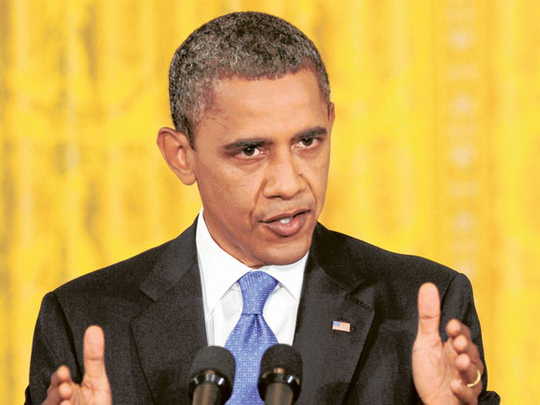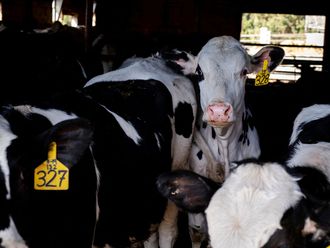
Whenever his presidency ends, Barack Obama’s legacy will be historic: posterity will know him as the first black president of a nation scarred at birth by a deep racial fault line.
But for Obama partisans, the hope of re-election lies in the idea that only with a full eight White House years, will he be remembered for the change he wrought, not just for who he was.
Though it was key to euphoria that greeted his election in 2008, Obama’s race has rarely been a dominant political theme since.
Quickly, the same political dynamics faced by many of his predecessors: divided, vicious, partisan politics threatened to swamp the 44th US president.
All presidents crave the validation of a second term, but for Obama, that desire may be even more keen, as his Republican foe Mitt Romney vows to quickly reverse much of his legacy.
Obama’s whole political project, the idea that America is not as divided as it seems, that a grass roots movement can change a nation from the bottom up, and that hope has tangible political power, is on the line.
Barack Obama was born on August 4, 1961, in Honolulu, Hawaii. His mother, Ann Durham, was originally from Kansas, and his father, Barack Obama Sr., was from Kenya.
Obama’s parents met at the University of Hawaii at Manoa, where Obama Sr. was a foreign student. They married in 1960 and divorced in 1964. Dunham later married an Indonesian graduate student, and she and Barack Obama moved to Indonesia in 1967.
Obama moved back to Honolulu to live with his maternal grandparents in 1971, choosing to stay with them even after his mother and sister returned to Indonesia in 1975. He obtained a scholarship to enter a private college-preparatory school, and graduated in 1979.
Obama began his college career at Occidental College in Los Angeles but later transferred to Columbia, where he studied political science. He graduated in 1983. He then pursued a law degree from Harvard Law School in 1988 and in his second year became the first African-American president of the Harvard Law Review. He graduated in 1991.
Obama worked as a community and political organiser in Chicago, Illinois, and was involved with a number of organisations before he was elected to the Illinois State Senate in 1996.
In 2004, he ran for the US Senate. As a senator, Obama was on the Senate Committees for Foreign Relations, Environment and Public Works, and Veterans Affairs. Obama made several foreign visits during his time as senator, going to the Middle East, Eastern Europe, Central Asia and Africa. He also met with Mahmoud Abbas before the latter became president of the Palestinian National Authority.
In 2007 Obama announced his bid for the 2008 presidency, and his campaign was remarkable in its ability to raise money particularly through small donations. After a tough neck-and-neck primary race with candidate Hillary Clinton, Obama won the Democratic Party’s nomination in August 2008. In November Obama won the presidential race against Republican nominee John McCain, with 52.9 per cent of the vote.
To address the economic crisis of 2008, Obama passed a $787 billion stimulus package and bailed out the auto industry and some large financial companies. He also enacted the Affordable Care Act, known colloquially as Obamacare, which includes a number of changes such as expanding Medicaid eligibility, providing incentives for employers to provide heath insurance, and prohibiting insurance companies from denying coverage based on pre-existing conditions.
Other important legislation passed by Obama include the Lily Ledbetter Fair Pay Act, which was the first law he signed into effect. The law relaxes the statue of limitations on taking legal action against employers because of pay. He also repealed the 1990s-era Don’t Ask Don’t Tell law which prohibits those who are openly homosexual from serving in the military, a key campaign promise.
Obama long opposed the wars of the Bush-era and vowed to withdraw troops from Iraq and Afghanistan. He also ordered the closing of Guantanamo Bay but was blocked by Congress.
Obama’s 2012 campaign has largely focused on what he will do for an economy that is growing painfully slowly. He has promised to create one million manufacturing jobs and increase US exports, especially to Asia.
A presidency of firsts, Obama was not only the first African-American president of the US, he was also the first one from Hawaii. He was the first candidate to turn down public funding of his 2008 presidential campaign since the system began in 1976, and on October 25, 2012, Obama also became the first president to cast an early vote. Obama also appointed the first Hispanic Supreme Court judge in 2009, and his appointment of another female judge in 2010 brought the total number of female judges to three, another Supreme Court first.
Some things have not changed. Obama retains the burning self confidence, — foes call it arrogance — and a fierce will to win.
In its way, victory on November 6 would have its own historic sweetness, should Obama defy economic blight that made other presidents one termers.
With inputs from AFP












